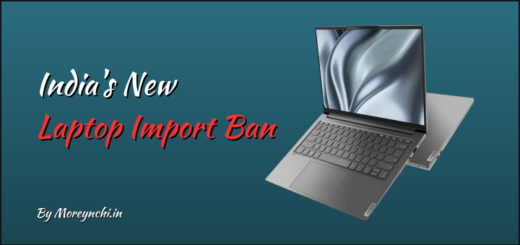Government Postpones Implementation of Import Restrictions on Laptops and Computers until October 31
The Indian government’s decision to postpone the implementation of import restrictions on laptops and computers until October 31 has been met with relief from stakeholders. This deferment provides manufacturers, businesses, and consumers additional time to adjust to the new regulations. While the aim of promoting domestic manufacturing remains intact, the postponement showcases the government’s responsiveness to concerns and the need for a well-managed transition. This strategic decision is poised to contribute to the growth of the domestic electronics sector while ensuring a stable supply of essential computing devices.

Introduction
In a significant development for the technology and electronics sector, the Indian government has decided to defer the implementation of the order pertaining to restrictions on the imports of laptops and computers. This decision comes as a relief to various stakeholders, including consumers, manufacturers, and businesses heavily reliant on these essential devices for their operations. The deferment announced recently, pushes the implementation deadline to October 31, providing a temporary respite and additional time for affected parties to adapt to the new regulations.
Background and Rationale
The decision to impose restrictions on the imports of laptops and computers was initially part of the government’s broader strategy to promote domestic manufacturing, bolster self-reliance, and reduce the country’s dependency on foreign electronic goods. While this objective is laudable, stakeholders raised concerns about the readiness of domestic manufacturers to meet the increased demand resulting from import restrictions. Moreover, businesses and consumers expressed apprehensions regarding potential disruptions to their operations and access to essential computing devices.
Stakeholder Engagement and Considerations
Recognizing the multifaceted impact of the proposed restrictions, the government engaged in consultations with various stakeholders, including industry associations, manufacturers, trade bodies, and consumer advocacy groups. These discussions highlighted the need for a phased approach that allows domestic manufacturers sufficient time to ramp up production capacities and ensure an uninterrupted supply of laptops and computers to the market. Additionally, the concerns raised by consumers about potential price hikes due to supply shortages were taken into account during these consultations.
Also Read,
Exploring the Import Ban of Laptops and Its Effects on Domestic Manufacturing
Deferment and Transitional Period
In response to the concerns voiced by stakeholders, the government decided to postpone the implementation of the import restrictions until October 31. This deferment serves as a transitional period during which manufacturers and businesses can recalibrate their supply chains, enhance production capabilities, and align their strategies with the evolving regulatory landscape. The extended timeline also offers consumers the assurance of continued availability of laptops and computers without sudden disruptions, allowing for smoother transitions to alternative options or domestically manufactured devices.
Overall Impact of Import Restrictions
India presently relies heavily on imports for a substantial portion of these devices, a situation the government aims to rectify by diminishing its dependence on foreign suppliers. These restrictions are concurrently perceived as a measure to safeguard the domestic IT sector from foreign competitors. Regrettably, this presents a less-than-ideal scenario for laptop consumers in India, as these limitations are poised to trigger an escalation in laptop and PC prices. This is anticipated because corporations will need to factor in the expenses linked to acquiring licenses, which will subsequently influence their pricing strategies.
The repercussions extend to the potential scarcity of laptops and PCs within the Indian market. Certain enterprises might opt to discontinue importing these products altogether, while others could curtail their shipments. This confluence of events is likely to cast an impact on consumers, businesses, and the IT industry alike. Consumers could face augmented costs for laptops and PCs, while businesses might need to identify alternative suppliers. Simultaneously, the IT industry may face revenue losses stemming from the reduced sale of imported laptops and PCs.
Summary
The decision to postpone the implementation of import restrictions on laptops and computers until October 31 reflects the Indian government’s responsiveness to the concerns of various stakeholders. This pragmatic approach balances the imperative of promoting domestic manufacturing with the need to ensure a stable supply of essential computing devices. As the technology landscape evolves, this deferment provides a strategic window for industry players to adapt, innovate, and collaborate, ultimately contributing to the growth of the domestic electronics sector.
Stay Healthy, Stay Safe, Jai Hind!



